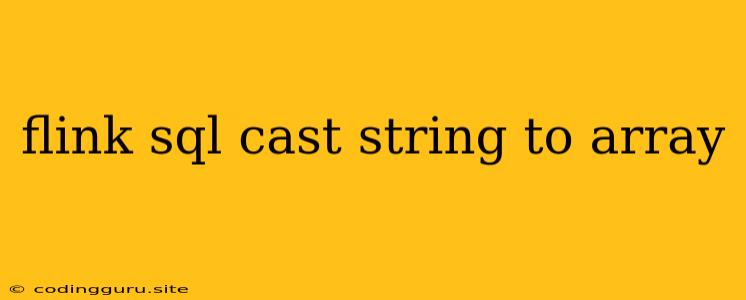How to Convert Strings to Arrays in Flink SQL
Flink SQL is a powerful tool for querying and processing data in Apache Flink. It provides a SQL-like syntax for expressing complex data transformations, making it easier to work with data streams and datasets. One common task is converting strings to arrays. This article will guide you through the process of casting strings to arrays in Flink SQL.
Why Do We Need to Cast Strings to Arrays?
Let's imagine you have a stream of events containing a field called "products," which stores a comma-separated list of purchased items. You want to analyze the individual products bought in each event. However, the "products" field is a string, not an array. To analyze each product individually, you need to convert the string into an array.
The split Function
The most straightforward way to achieve this is using the split function. This function takes a string and a delimiter as arguments and returns an array of strings.
Example:
SELECT split(products, ',') AS product_array
FROM events;
In this example, the split function takes the "products" field and splits it by the delimiter ",". The resulting array is stored in a new field named "product_array."
Handling NULL Values
You might encounter situations where the "products" field contains null values. Applying the split function directly on null values will result in an error. To handle this, you can use the COALESCE function to replace null values with an empty string before applying the split function.
Example:
SELECT split(COALESCE(products, ''), ',') AS product_array
FROM events;
This code snippet ensures that null values in the "products" field are replaced with an empty string before being split, preventing errors.
Casting to Specific Data Types
In some cases, you might need to cast the individual elements of the array to specific data types, such as integers or decimals. Flink SQL allows you to use the CAST function for this purpose.
Example:
SELECT CAST(split(products, ',') AS ARRAY) AS product_array
FROM events;
Here, we use the CAST function to convert the array of strings returned by split to an array of integers.
Limitations and Considerations
While Flink SQL provides convenient ways to work with arrays, it's important to keep in mind that certain operations might not be directly supported on array fields. For instance, directly querying the elements of an array might not be possible. In such scenarios, you might need to consider using Flink's Java API for more advanced array manipulation.
Conclusion
Casting strings to arrays in Flink SQL is a common task for processing structured data. The split function provides a simple and efficient way to achieve this conversion. Remember to handle null values appropriately using the COALESCE function and use the CAST function to convert the array elements to specific data types if necessary. Understanding these techniques will empower you to effectively manipulate and analyze data stored as strings within your Flink SQL queries.
